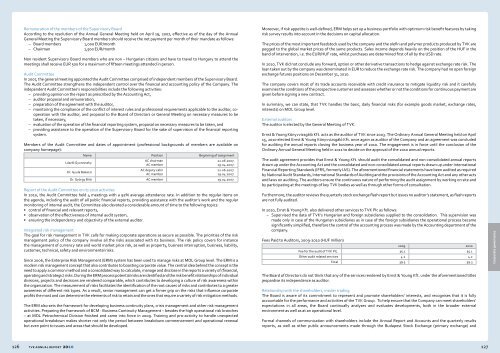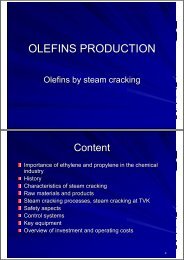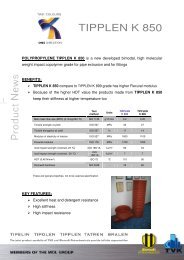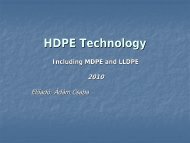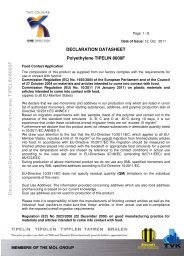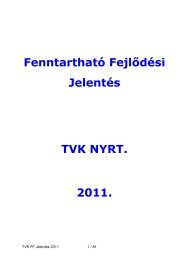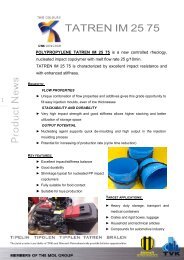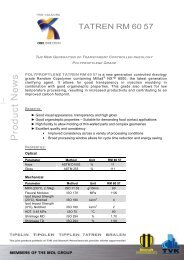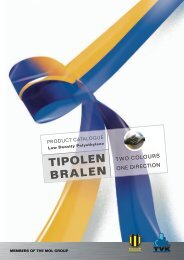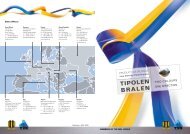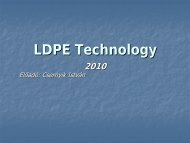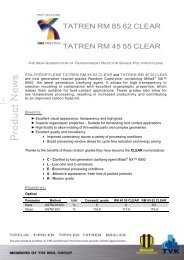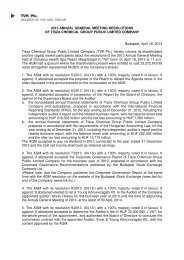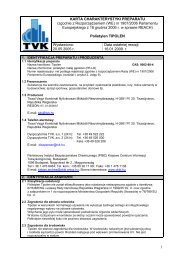TVK Annual Report 2010 (pdf, 2.5 MB)
TVK Annual Report 2010 (pdf, 2.5 MB)
TVK Annual Report 2010 (pdf, 2.5 MB)
You also want an ePaper? Increase the reach of your titles
YUMPU automatically turns print PDFs into web optimized ePapers that Google loves.
Remuneration of the members of the Supervisory Board<br />
According to the resolution of the <strong>Annual</strong> General Meeting held on April 19, 2007, effective as of the day of the <strong>Annual</strong><br />
General Meeting the Supervisory Board members should receive the net payment per month of their mandate as follows:<br />
––<br />
Board members 1,000 EUR/month<br />
––<br />
Chairman 1,500 EUR/month<br />
Non resident Supervisory Board members who are non – Hungarian citizens and have to travel to Hungary to attend the<br />
meetings shall receive EUR 500 for a maximum of fifteen meetings attended in person.<br />
Audit Committee<br />
In 2007, the general meeting appointed the Audit Committee comprised of independent members of the Supervisory Board.<br />
The Audit Committee strengthens the independent control over the financial and accounting policy of the Company. The<br />
independent Audit Committee’s responsibilities include the following activities:<br />
––<br />
providing opinion on the report as prescribed by the Accounting Act,<br />
––<br />
auditor proposal and remuneration,<br />
––<br />
preparation of the agreement with the auditor,<br />
––<br />
monitoring the compliance of the conflict of interest rules and professional requirements applicable to the auditor, cooperation<br />
with the auditor, and proposal to the Board of Directors or General Meeting on necessary measures to be<br />
taken, if necessary,<br />
––<br />
evaluation of the operation of the financial reporting system, proposal on necessary measures to be taken, and<br />
––<br />
providing assistance to the operation of the Supervisory Board for the sake of supervision of the financial reporting<br />
system.<br />
Members of the Audit Committee and dates of appointment (professional backgrounds of members are available on<br />
company homepage):<br />
Name Position Beginning of assignment<br />
László Gyurovszky<br />
Dr. Gyula Bakacsi<br />
AC chairman<br />
AC member<br />
AC deputy cahir<br />
AC member<br />
22.06.2007.<br />
19.04.2007.<br />
22.06.2007.<br />
19.04.2007.<br />
Dr. György Bíró AC member 19.04.2007.<br />
<strong>Report</strong> of the Audit Committee on its <strong>2010</strong> activities<br />
In <strong>2010</strong>, the Audit Committee held 4 meetings with a 92% average attendance rate. In addition to the regular items on<br />
the agenda, including the audit of all public financial reports, providing assistance with the auditor’s work and the regular<br />
monitoring of internal audit, the Committee also devoted a considerable amount of time to the following topics:<br />
• control of financial and relevant reports,<br />
• observation of the effectiveness of internal audit system,<br />
• ensuring the independency and objectivity of the external auditor.<br />
Integrated risk management<br />
The goal for risk management in <strong>TVK</strong> calls for making corporate operations as secure as possible. The priorities of the risk<br />
management policy of the company involve all the risks associated with its business. The risk policy covers for instance<br />
the management of currency rate and world market price risk, as well as property, business interruption, business, liability,<br />
customer, technical, safety and environmental risks.<br />
Since 2006, the Enterprise Risk Management (ERM) system has been used to manage risks at MOL Group level. The ERM is a<br />
modern risk management concept that also contributes to boosting corporate value. The central idea behind the concept is the<br />
need to apply a common method and a consolidated way to calculate, manage and disclose in the reports a variety of (financial,<br />
operating and strategic) risks. During the ERM process potential risks are identified and the risk benefit relationships of individual<br />
divisions, projects and decisions are rendered comparable, which contributes to developing a culture of risk awareness within<br />
the organization. The measurement of risks facilitates the identification of the root causes of risks and contributes to a greater<br />
awareness of different risk types. As a result, senior management can get a firmer grip on the risks that influence corporate<br />
profits the most and can determine the elements of risk to retain and the ones that require a variety of risk mitigation methods.<br />
The ERM also sets the framework for developing business continuity plans, crisis management and other risk management<br />
activities. Preparing the framework of BCM - Business Continuity Management – besides the high operational risk branches<br />
– at MOL Petrochemical Division finished and came into force in 2009. Training and pro-activity to handle unexpected<br />
operational breakdown makes shorter not only the period between breakdown commencement and operational renewal<br />
but even point to issues and areas that should be developed.<br />
Moreover, if risk appetite is well-defined, ERM helps set up a business portfolio with optimum risk benefit features by taking<br />
risk survey results into account in the decisions on capital allocation.<br />
The prices of the most important feedstock used by the company and the olefin and polymer products produced by <strong>TVK</strong> are<br />
pegged to the global market prices of the same products. Sales income depends heavily on the position of the HUF in the<br />
band of intervention, i.e. the EUR/HUF rate, whilst purchases are determined first of all by the USD rate.<br />
In <strong>2010</strong>, <strong>TVK</strong> did not conclude any forward, option or other derivative transactions to hedge against exchange rate risk. The<br />
loan taken out by the company was denominated in EUR to reduce the exchange rate risk. The company had no open foreign<br />
exchange futures positions on December 31, <strong>2010</strong>.<br />
The company covers most of its trade accounts receivable with credit insurance to mitigate liquidity risk and it carefully<br />
examines the conditions of the prospective customer and assesses whether or not the conditions for continuous payment are<br />
given before signing a new contract.<br />
In summary, we can state, that <strong>TVK</strong> handles the basic, daily financial risks (for example goods market, exchange rates,<br />
interests) on MOL Group level.<br />
External auditors<br />
The auditor is elected by the General Meeting of <strong>TVK</strong>.<br />
Ernst & Young Könyvvizsgáló Kft. acts as the auditor of <strong>TVK</strong> since 2003. The Ordinary <strong>Annual</strong> General Meeting held on April<br />
15, <strong>2010</strong> elected Ernst & Young Könyvvizsgáló Kft. once again as auditor of the Company and an agreement was concluded<br />
for auditing the annual reports closing the business year of <strong>2010</strong>. The engagement is in force until the conclusion of the<br />
Ordinary <strong>Annual</strong> General Meeting held in 2011 to decide on the approval of the <strong>2010</strong> annual reports.<br />
The audit agreement provides that Ernst & Young Kft. should audit the consolidated and non-consolidated annual reports<br />
drawn up under the Accounting Act and the consolidated and non-consolidated annual reports drawn up under International<br />
Financial <strong>Report</strong>ing Standards (IFRS, formerly IAS). The aforementioned financial statements have been audited as required<br />
by National Audit Standards, International Standards of Auditing and the provisions of the Accounting Act and any other acts<br />
and laws on auditing. The auditors ensure the continuous nature of performing the audit assignment by working on site and<br />
by participating at the meetings of key <strong>TVK</strong> bodies as well as through other forms of consultation.<br />
Furthermore, the auditor reviews the quarterly stock exchange flash report but issues no auditor’s statement, as flash reports<br />
are not fully audited.<br />
In <strong>2010</strong>, Ernst & Young Kft. also delivered other services to <strong>TVK</strong> Plc as follows:<br />
––<br />
Supervised the data of <strong>TVK</strong>’s Hungarian and foreign subsidiaries supplied to the consolidation. This supervision was<br />
made only in case of the Hungarian subsidiaries as in case of the foreign subsidiaries the operational process became<br />
significantly simplified, therefore the control of the accounting process was made by the Accounting department of the<br />
company.<br />
Fees Paid to Auditors, 2009-<strong>2010</strong> (HUF million)<br />
2009 <strong>2010</strong><br />
Fee for the audit of <strong>TVK</strong> Plc. 35.1 35.1<br />
Other audit related services 4.2 4.2<br />
Total 39.3 39.3<br />
The Board of Directors do not think that any of the services rendered by Ernst & Young Kft. under the aforementioned titles<br />
jeopardise its independence as auditor.<br />
Relationship with the shareholders, insider trading<br />
The Board is aware of its commitment to represent and promote shareholders’ interests, and recognises that it is fully<br />
accountable for the performance and activities of the <strong>TVK</strong> Group. To help ensure that the Company can meet shareholders’<br />
expectations in all areas, the Board continually analyses and evaluates developments, both in the broader external<br />
environment as well as at an operational level.<br />
Formal channels of communication with shareholders include the <strong>Annual</strong> <strong>Report</strong> and Accounts and the quarterly results<br />
reports, as well as other public announcements made through the Budapest Stock Exchange (primary exchange) and<br />
Corporate governance<br />
126 <strong>TVK</strong> <strong>Annual</strong> <strong>Report</strong> <strong>2010</strong><br />
127


